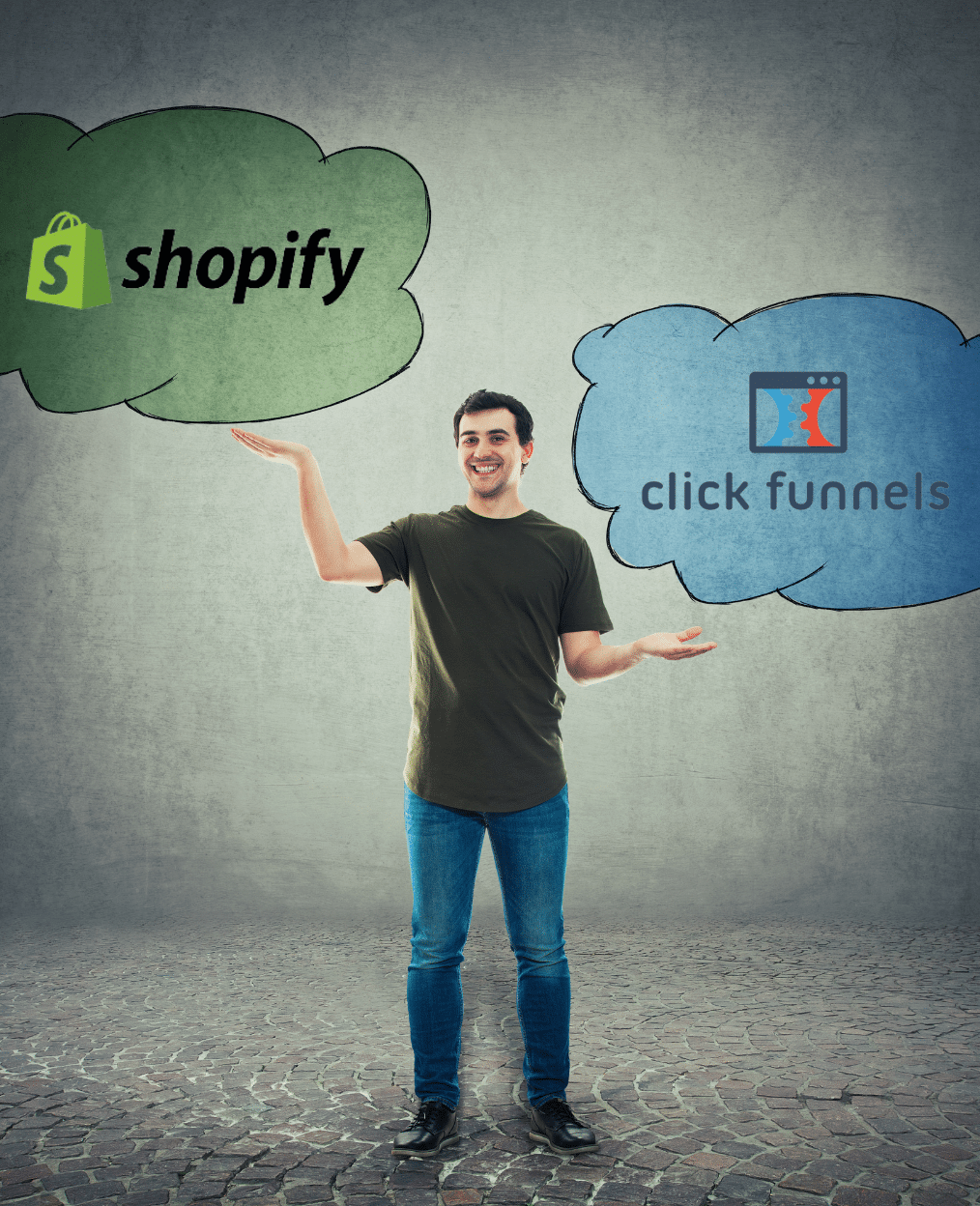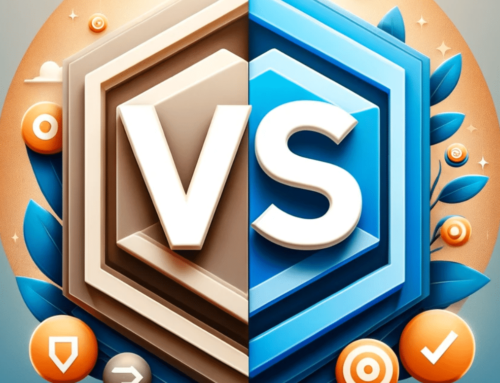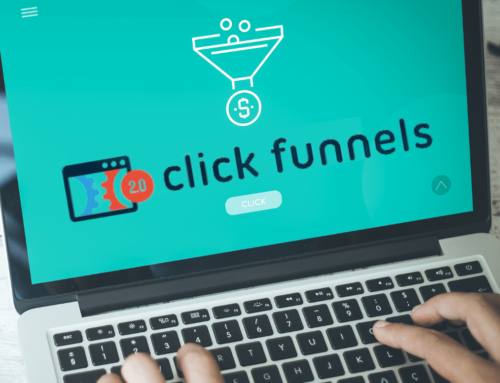But as captivating as these giants were, many aspiring entrepreneurs found themselves in a dilemma – which platform is right for them? And thus, the ultimate showdown began: ClickFunnels Vs Shopify
Looking to launch your own e-commerce business but unsure which platform to choose? Look no further, as we bring you the ultimate showdown between ClickFunnels and Shopify.
In this battle for e-commerce supremacy, we dive deep into their features, ease of use, pricing, and support to determine which platform reigns supreme in terms of driving success for your online business. ClickFunnels, known for its sales funnel capabilities, offers a comprehensive suite of tools designed to optimize marketing and sales funnels.
On the other hand, Shopify, a global e-commerce giant, boasts a robust ecosystem and a wide range of themes and plugins to enhance your online store. Join us as we compare these two heavyweights head-to-head, evaluating factors such as customizable templates, payment gateways, inventory management, and SEO options. We’ll also consider their user-friendliness, scalability, and customer support to provide you with a well-rounded perspective on which platform best suits your specific business needs.
So, whether you’re a seasoned entrepreneur or just starting out, gear up for this battle of e-commerce titans and discover which platform emerges victorious in the quest for ultimate e-commerce success.
The Sales Funnel Wizard: ClickFunnels
ClickFunnels is a powerful online sales funnel builder that allows you to design and create highly-converting sales funnels. Founded in 2014 by marketing guru Russell Brunson, ClickFunnels has become a favorite among entrepreneurs and digital marketers.
ClickFunnels is perfect for those who want to build an entire sales funnel, from landing pages and email marketing to upsells and order forms. It’s all about maximizing your profits through effective marketing strategies and a seamless user experience. You can check our in depth Clickfunnels 2.0 review.
The E-commerce Titan: Shopify
Shopify, on the other hand, is an e-commerce platform that empowers you to create an online store to sell your products.
Founded in 2006 by Tobi Lütke, Daniel Weinand, and Scott Lake, Shopify has grown to become one of the largest e-commerce platforms globally, hosting over a million businesses.
Shopify is an excellent choice for entrepreneurs looking to create a comprehensive online store with inventory management, payment processing, and various sales channels. It offers a robust platform for selling physical or digital products, with a focus on ease of use and scalability.
1- Free Trials: Test Before You Invest
Before making a decision between ClickFunnels and Shopify, you might want to test out the platforms to see which one works best for your needs. Fortunately, both platforms offer free trials, allowing you to explore their features and functionalities without committing to a paid plan.
ClickFunnels
ClickFunnels offers a 14-day free trial for new users. During this period, you can create and customize funnels, integrate with third-party tools, and access the platform’s full range of features. This trial allows you to get a feel for the platform and determine if ClickFunnels is the right solution for your business needs.
To sign up for the ClickFunnels free trial, visit their website and click the “Start Free 14-Day Trial Now” button. You’ll need to enter your contact information and payment details, but you won’t be charged until the trial period ends. You can cancel anytime within 14 days if you decide that ClickFunnels isn’t for you.
Shopify
Shopify also offers a 14-day free trial for new users. During this time, you can set up your online store, add products, and explore the platform’s features, including the Shopify App Store. The trial period allows you to evaluate if Shopify is the right fit for your e-commerce needs.
To sign up for the Shopify free trial, visit their website and click the “Start Free Trial” button. You’ll need to provide your email address, create a password, and enter some basic information about your business. Unlike ClickFunnels, Shopify doesn’t require you to enter your payment details when signing up for the trial. Once your 14-day trial ends, you’ll need to choose a paid plan to continue using the platform.
By taking advantage of the free trials offered by ClickFunnels and Shopify, you can thoroughly assess each platform and make an informed decision based on your hands-on experience. This invaluable opportunity ensures that you invest in the solution that’s best suited to your business needs and goals.
2- Pricing and Plans
A crucial factor in choosing between ClickFunnels and Shopify is the pricing and plans they offer. Each platform has different pricing structures and features, so it’s essential to evaluate which one aligns with your budget and requirements.
ClickFunnels
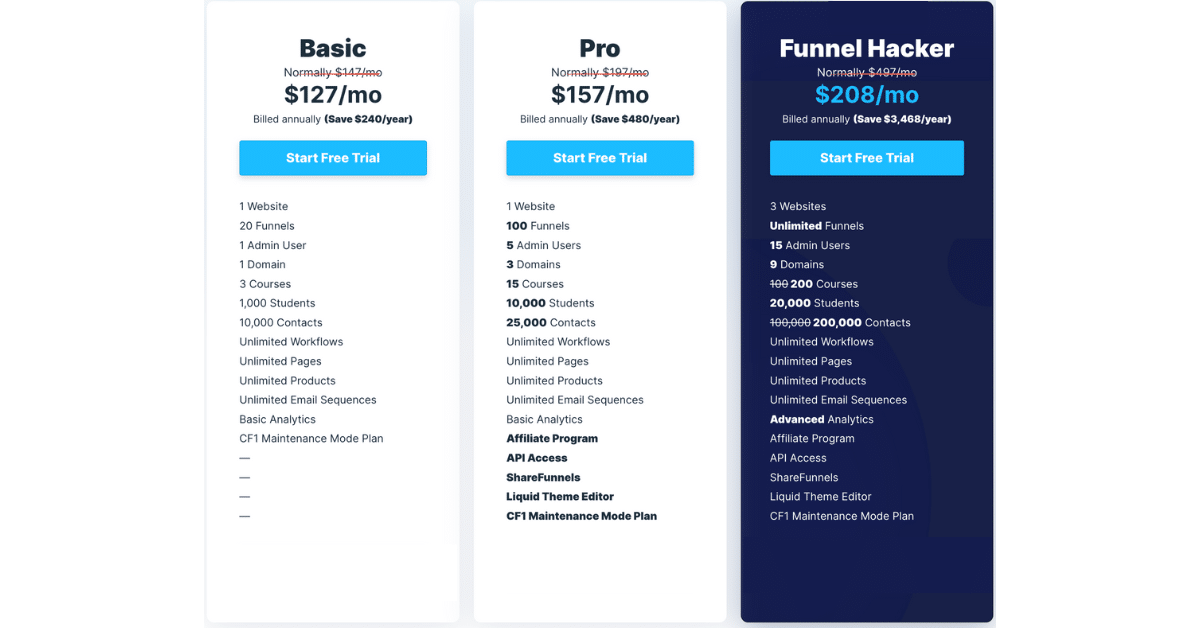
Shopify
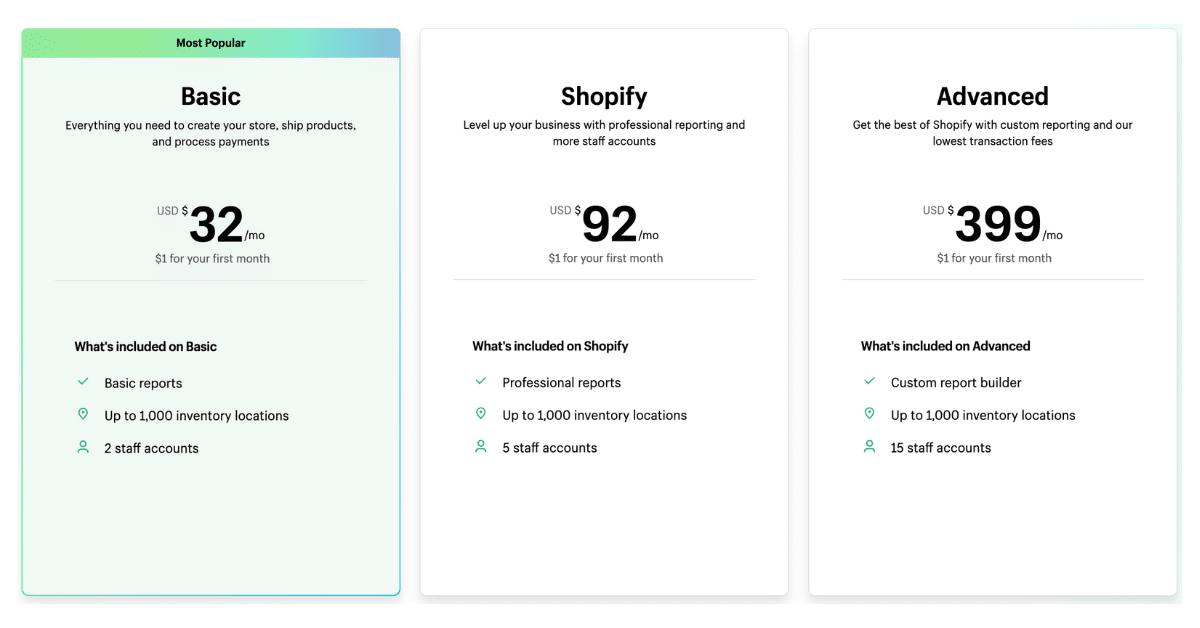
3- Features and Capabilities
ClickFunnels Features
ClickFunnels is a powerful platform designed to help businesses create effective sales funnels, boost conversions, and increase revenue. With a range of features tailored to meet the needs of different users, ClickFunnels offers everything you need to market, sell, and deliver your products online.
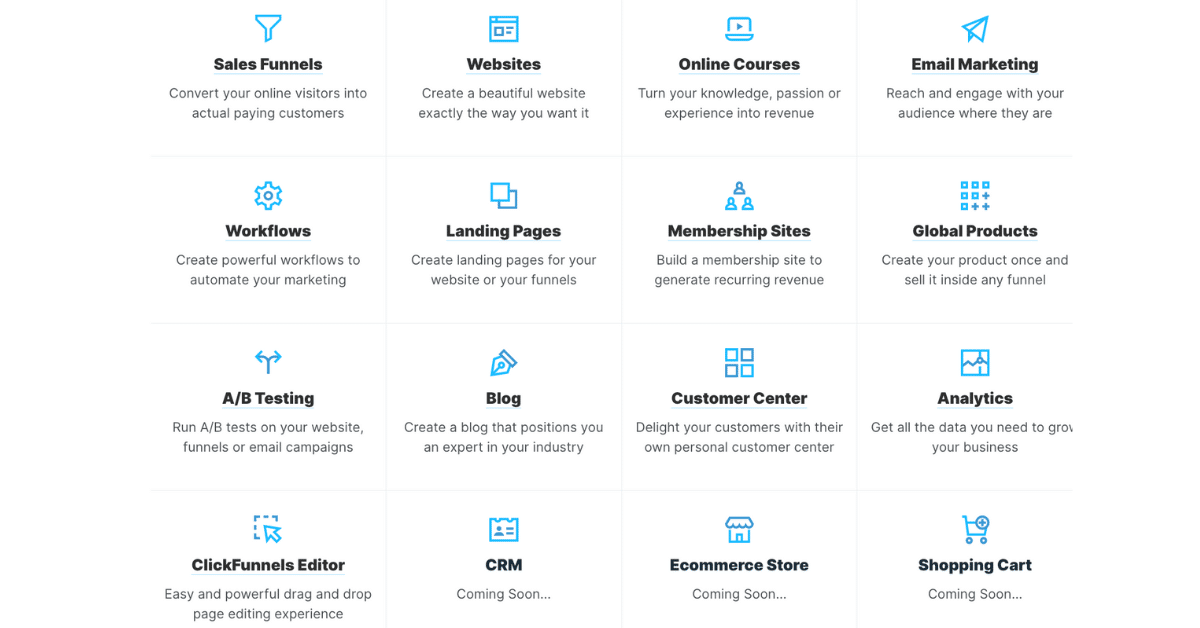
Let’s dive into some key features offered by ClickFunnels:
-
Drag-and-drop funnel builder: The intuitive drag-and-drop editor allows users to quickly design and customize funnels without any coding knowledge. With this feature, you can easily create landing pages, sales pages, and other funnel components, ensuring a seamless and visually appealing user experience.
-
Sales funnel: ClickFunnels offers a vast library of pre-built sales funnel templates, designed to cater to various industries and marketing goals. These templates can be easily customized using the drag-and-drop editor, saving you time and effort while still maintaining a professional look.
-
Email marketing automation: With built-in email marketing automation, ClickFunnels enables you to create targeted email campaigns, segment your audience, and automate follow-up sequences, streamlining your marketing efforts and boosting engagement.
-
Affiliate management system: ClickFunnels’ built-in affiliate management system allows you to recruit, manage, and track affiliates who promote your products. This feature makes it easy to set up and run an affiliate program, helping you to expand your reach and increase sales.
-
Membership site creation: With ClickFunnels, you can create exclusive membership areas where your subscribers or customers can access premium content. This feature allows you to monetize your content, build customer loyalty, and generate recurring revenue.
-
A/B split testing: The A/B split testing feature enables you to test different variations of your funnel elements, such as headlines, images, or buttons, to determine which version drives the most conversions. This data-driven approach helps you optimize your funnels for maximum performance.
-
Comprehensive analytics and reporting: ClickFunnels provides detailed analytics and reporting features, allowing you to track the performance of your funnels, identify areas for improvement, and make informed decisions about your marketing strategies.
-
Integrated shopping cart: The built-in shopping cart feature ensures a smooth checkout experience for your customers, making it easy for them to complete their purchases within your sales funnels.
-
Multiple payment gateways: ClickFunnels supports a variety of popular payment gateways, such as Stripe, PayPal, and Apple Pay, ensuring a seamless and secure payment process for your customers.
These are just some of the powerful features offered by ClickFunnels, making it an ideal solution for businesses looking to create high-converting sales funnels and effectively market, sell, and deliver their products online. By leveraging these features, you can streamline your marketing efforts, increase conversions, and ultimately grow your business.
Shopify Features
Shopify is a leading e-commerce platform designed to help businesses create, manage, and scale their online stores. With a wide range of features tailored to meet the needs of various users, Shopify offers everything you need to build a successful online business.

Below are some key features offered by Shopify:
Shopify is a leading e-commerce platform designed to help businesses create, manage, and scale their online stores. With a wide range of features tailored to meet the needs of various users, Shopify offers everything you need to build a successful online business. Here, we’ll dive into the key features offered by Shopify, as detailed on their pricing page:
-
Online store builder: Shopify’s user-friendly store builder allows you to create a professional-looking online store without any coding knowledge. With customizable themes and an easy-to-use interface, you can create a store that reflects your brand and appeals to your target audience.
-
Unlimited products and inventory management: With Shopify, you can add and manage an unlimited number of products in your store, making it easy to scale your business as it grows. The platform also offers inventory management features, such as tracking stock levels, setting up automatic reorder notifications, and managing product variants.
-
Multiple sales channels: Shopify enables you to sell across various channels, including online, in-person, and on social media platforms like Facebook and Instagram. This multi-channel approach helps you reach a wider audience and increase sales.
-
Integrated payment processing: Shopify offers a built-in payment gateway, Shopify Payments, which supports multiple currencies and allows for a seamless checkout experience. The platform also integrates with a variety of popular payment gateways, such as PayPal, Stripe, and Apple Pay.
-
Shipping and fulfillment: Shopify provides a range of shipping and fulfillment features, including real-time shipping rates, automatic tax calculations, and integrations with leading shipping carriers. This makes it easy to manage your shipping process and deliver products to customers worldwide.
-
Marketing and SEO tools: Shopify offers built-in marketing tools, such as email marketing campaigns, abandoned cart recovery, and search engine optimization (SEO) features. These tools help you drive traffic to your store, boost conversions, and increase sales.
-
Analytics and reporting: Shopify’s comprehensive analytics and reporting features allow you to track your store’s performance, identify trends, and make informed decisions about your business strategies. The platform also integrates with Google Analytics for additional insights.
-
Mobile app: The Shopify mobile app enables you to manage your store on-the-go, with features like order management, product updates, and customer support. This makes it easy to stay connected and responsive to your business needs, even when you’re away from your computer.
-
App Store: Shopify’s App Store offers a wide range of third-party apps and integrations, enabling you to customize and extend your store’s functionality. From marketing automation to inventory management, the App Store helps you find solutions that meet your unique business requirements.
4- Flexibility and Customization
ClickFunnels
One key advantage of ClickFunnels is its flexibility and customization options. The platform offers a wide array of pre-built funnel templates that cater to different industries and marketing goals. Moreover, the drag-and-drop editor allows you to modify these templates or create your own funnels from scratch, giving you full control over the design and layout of your sales funnels. This flexibility empowers you to build funnels that resonate with your target audience and reflect your unique brand identity.
Shopify
Shopify also excels when it comes to customization. The platform offers numerous themes (both free and paid) that cater to different niches and design preferences. Furthermore, its drag-and-drop builder lets you easily customize your store’s layout, colors, and branding. For those with coding skills, Shopify allows you to access and modify the underlying code of your theme, giving you even more control over your store’s design.
5- Community and Support
ClickFunnels
ClickFunnels has a strong community of entrepreneurs, marketers, and business owners who are eager to share their experiences, insights, and advice. The ClickFunnels Facebook group, with over 200,000 members, is a valuable resource for learning from fellow users and gaining inspiration. In addition, ClickFunnels offers comprehensive customer support, including live chat, email support, and a knowledge base filled with helpful articles and tutorials.
Shopify
Shopify’s community is equally impressive, boasting a thriving ecosystem of merchants, developers, and e-commerce enthusiasts. The Shopify Community forums provide a platform for users to share their experiences, ask questions, and offer support to one another. Shopify also has a vast library of resources, including guides, tutorials, and blog posts, to help users get the most out of the platform. Their customer support is available 24/7 via chat, email, and phone, ensuring that you always have someone to turn to when you need assistance.
6- Integrations and Add-ons
ClickFunnels
ClickFunnels integrates with a variety of popular third-party tools and services, such as email marketing platforms (e.g., Mailchimp, ActiveCampaign), payment gateways (e.g., Stripe, PayPal), and CRM systems (e.g., HubSpot, Salesforce). These integrations allow you to streamline your marketing efforts, automate tasks, and enhance your sales funnels’ functionality.
Shopify
Shopify’s App Store is home to over 6,000 apps and integrations, covering a vast range of functionalities. From marketing automation and SEO optimization to inventory management and customer support, you’ll find an app to suit your specific needs. These apps enable you to extend your store’s capabilities and create a customized e-commerce experience for your customers.
The Verdict: ClickFunnels vs Shopify
In the ClickFunnels vs Shopify showdown, understanding the features of each platform is essential to make the right decision for your business. Here’s a brief comparison:
-
The ClickFunnels vs Shopify debate often starts with marketing features: While ClickFunnels excels in providing a complete sales funnel solution, Shopify focuses more on e-commerce functionalities.
-
Pricing is another critical factor when comparing ClickFunnels vs Shopify: ClickFunnels offers different pricing tiers, while Shopify provides a more scalable pricing structure depending on your business needs.
-
In terms of design and customization, ClickFunnels vs Shopify presents another interesting point of comparison: Shopify offers a range of customizable themes, while ClickFunnels has a variety of templates for building funnels.
-
When it comes to integrations, the ClickFunnels vs Shopify battle heats up: Both platforms offer numerous integrations to expand their functionality, catering to various business needs.
-
Lastly, customer support plays a vital role in the ClickFunnels vs Shopify decision-making process: Both platforms provide excellent customer support to help users navigate and troubleshoot any issues that may arise.
Choosing between ClickFunnels and Shopify depends on your business’s specific needs and goals. Assess the features, pricing, and functionality of each platform, and pick the one that aligns with your business objectives. In this final act, we’ll delve deeper into the reasons why you might choose one platform over the other.
Choose ClickFunnels if:
1. High-converting sales funnels are your top priority
If your main goal is to create sales funnels that turn leads into customers effectively, ClickFunnels is your go-to choice. With its powerful suite of tools, you can craft a seamless and persuasive journey for your prospects, increasing the likelihood of conversions and maximizing your profits.
2. Marketing and lead generation take center stage
ClickFunnels shines when it comes to generating leads and nurturing them through the sales process. With its email marketing integrations, A/B testing, and targeted upsells and downsells, you can create personalized experiences for your leads and customers, improving your overall marketing results.
3. Membership areas and affiliate management are crucial
If your business model relies on offering exclusive content to your subscribers or managing a network of affiliates, ClickFunnels has you covered. Its built-in membership area feature and affiliate management tools allow you to create a comprehensive ecosystem that caters to these specific needs.
4. You’re committed to a sales funnel-centric platform
Investing in ClickFunnels means you’re ready to focus on a platform specifically designed for building high-converting sales funnels. While it may not have the extensive e-commerce features that Shopify offers, its laser-focused approach to funnel building can be a game-changer for the right business.
Choose Shopify if:
1. A complete e-commerce platform is essential
If your primary goal is to create and manage an online store, Shopify is the clear winner. Its comprehensive set of e-commerce features, such as inventory management, shipping, and payment processing, make it easy for you to run your store efficiently.
2. You need a scalable solution for your growing business
Shopify is built to grow with your business, providing you with the necessary tools and resources to expand as needed. From its range of pricing plans to its vast app ecosystem, Shopify enables you to customize and scale your online store to meet your evolving needs.
3. A diverse app ecosystem is critical
Shopify’s App Store is a treasure trove of third-party apps and integrations that can enhance your store’s functionality. Whether you need advanced analytics, marketing tools, or customer support solutions, you’ll find an app to meet your needs, making it easy to tailor your store to your specific requirements.
4. Ease of use is a top priority
Shopify is well-known for its user-friendly interface and intuitive design. Its drag-and-drop website builder and straightforward product management make it easy for even the least tech-savvy entrepreneurs to set up and run their online store.
In Conclusion, both ClickFunnels and Shopify are formidable platforms, each wielding unique features and capabilities. The ideal choice for your business depends on your specific needs and goals.
Are you focused on crafting high-converting sales funnels and excelling in lead generation? ClickFunnels is the platform for you. Or perhaps you’re looking to build a comprehensive online store with robust e-commerce features? In that case, Shopify is your champion.
it’s essential to conduct thorough market research to understand your target audience and their preferences. By identifying profitable business ideas and analyzing your competitors, you can make informed decisions about the platform that best suits your needs.
Fortunately, both ClickFunnels and Shopify provide powerful business tools that can help you streamline this process.
Frequently Asked Questions (FAQ)
Q: Can I use both ClickFunnels and Shopify together?
A: Yes, you can integrate ClickFunnels with Shopify to combine the strengths of both platforms. By doing so, you can leverage ClickFunnels’ high-converting sales funnels for lead generation and marketing while utilizing Shopify’s robust e-commerce features for product management, inventory control, and order fulfillment.
Q: Is it possible to migrate my existing online store from another platform to Shopify or ClickFunnels?
A: Yes, both Shopify and ClickFunnels allow you to migrate your existing online store from another platform. Shopify offers a range of migration tools and resources to help you import your products, customers, and orders from other e-commerce platforms. ClickFunnels, on the other hand, focuses on transferring your existing sales funnels and marketing assets. It’s important to note that you may need to redesign your store or funnels to fit the respective platforms’ templates and layouts.
Q: Can I sell digital products using ClickFunnels and Shopify?
A: Both ClickFunnels and Shopify allow you to sell digital products, such as e-books, online courses, and software. ClickFunnels is especially well-suited for selling digital products through sales funnels, offering features like digital product delivery and membership site creation. On the other hand, Shopify provides the ability to sell digital products through its online store and offers integration with third-party apps to help manage and deliver digital content.
Q: Are there any transaction fees on ClickFunnels and Shopify?
A: ClickFunnels does not charge transaction fees on its platform. However, you will still be subject to the fees charged by your chosen payment gateway, such as Stripe or PayPal.
On the other hand, Shopify charges transaction fees if you use a payment gateway other than Shopify Payments. The transaction fees vary depending on your Shopify plan, with higher-tier plans offering lower fees. If you choose to use Shopify Payments, you will not be charged additional transaction fees but will still be subject to credit card processing fees.
Q: Do ClickFunnels and Shopify offer any discounts for annual billing?
A: Both ClickFunnels and Shopify provide discounts for users who opt for annual billing instead of monthly billing. ClickFunnels offers up to a 16% discount on their Platinum plan when billed annually, while Shopify offers up to a 20% discount on their Basic, Shopify, and Advanced plans when billed annually. These discounts can help you save money in the long run if you’re committed to using either platform for an extended period.
Subscribe to our newsletter
Get valuable insights and business guidance sent to your email.

